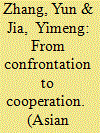| Srl | Item |
| 1 |
ID:
179970


|
|
|
|
|
| Summary/Abstract |
Why and how did the International Labor Organization and the military junta of Myanmar transform their relationship so dramatically, from confrontation to cooperation, between 2007 and 2010? What insights can be drawn from this case regarding the successful operation of an international organization in an authoritarian environment? By investigating the evolution of the military leadership’s perception, this article aims to demystify authoritarian decision-making and identify the interactive mechanisms operating between internal and external dynamics and between an authoritarian regime and an international organization. The qualitative fieldwork includes direct interviews with former top military government leaders, who provide valuable insights into the decision-making logic at the highest level.
|
|
|
|
|
|
|
|
|
|
|
|
|
|
|
|
| 2 |
ID:
127794


|
|
|
|
|
| Publication |
2014.
|
| Summary/Abstract |
The conventional understanding of Japan's approach to East Asian regionalism is that of a primacy struggle with China, using both hard and soft balancing. However, Japan's strategic priority remains extending and managing the alliance with the US in the post-Cold War era. The increasing trilateral dynamics among China, Japan and the US have largely influenced Japan's perception of its position in the alliance, which frames the basic thinking of Japan's attitudes toward regionalism. Japan's policy and diplomacy toward regionalism have been subordinate to alliance management rather than to a strategic policy shift. Meanwhile, Japan's perception of its regional influence vis-à-vis China also affects Japan's calculation in regionalism.
|
|
|
|
|
|
|
|
|
|
|
|
|
|
|
|
| 3 |
ID:
181214


|
|
|
|
|
| Summary/Abstract |
Although Sino–Japanese relations have been on a recovery course, the deterioration of ties in the first one and a half decades since 2000 should not be forgotten. This article aims to unpack China’s perception formation mechanism toward Japan during these turbulent fifteen years by introducing the perspective of strategic perception. Because China’s strategic perception toward Japan is largely derived from its overall perceptions of the international system, this article focuses on China’s strategic elites to systemically trace the evolution of China’s perception of Japan and its policy implications, and to provide a new perception equilibrium that reduced the US factor in the formation of a mutual Sino–Japanese perception.
|
|
|
|
|
|
|
|
|
|
|
|
|
|
|
|